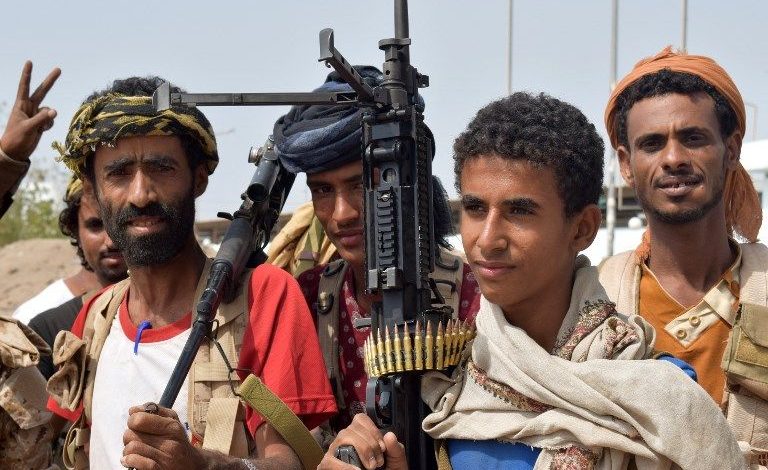Maritime threats and child recruitment… UN report highlights Houthi crimes

A report by UN experts documented the crimes committed by the Houthi terrorist militia against children, and their use of the ports of Hodeida and As-Salif to launch mined boats in the Red Sea.
The 300-page annual UN report presented yesterday to the Security Council showed the mass crimes of the Houthi terrorist militias in Yemen, the most prominent of which are the growing maritime threats and the violation of the UN arms embargo, and the most prominent coup leaders involved in the recruitment of children.
The report, which covered the period from December 6, 2020 to December 5, 2021, held Houthi militias responsible for the four most prominent internal attacks in Yemen over the past year, despite attempts by the putschists to distance themselves from three of them.
The attacks were a double bombing of Aden airport, Mokha port, Mokha city, and al-Anad base, all launched from the Houthi-controlled east of Taiz, the report said, exposing the engineering of Houthi leader Abdullatif al-Mahdi for these bloody attacks.
Houthi militia launches of boats, landmines, and drones to threaten shipping have grown into exploiting Hodeida ports (As-Salif, Ras Isa, and Hodeida port) to target shipping south of the Red Sea.
According to the UN report, the firing of mined boats from Houthi-controlled areas increased dramatically, confirming that the militias had assembled and released these water-borne explosive devices in the ports of Hodeida and As-Salif.
The Houthis deployed a new generation of Shark 33, two-engine-powered motor boats that require more fuel, as well as using the first-generation single-engine Blue Fish to attack ships docking at Saudi ports 1,000 kilometers from Hodeida.
The Panel concluded that it was impossible for the boats to operate independently, especially in the April 27, 2012 attack that targeted the Saudi port of Yanbu, because of the long distance to the nearest Houthi point on the Yemeni coast, and the probability that the AM ship would participate in the launch of these water-borne devices.
Since the coup in late 2014 until early January, the Houthis have used more than 100 boat bombs, according to the Saudi-led Arab coalition.
The UN’s confirmation of the use of Houthi militias as a source of navigational threats shows how dangerous these ports and more than 500 kilometers of coastline are to remain under the control of the Iranian-backed terrorist group.
The Houthis continue to lay naval mines in the Red Sea, near various islands east of the three ports (Hodeida, As-Salif, and Ras Isa) under their control, and other sea mines drifting in the border waters with Saudi Arabia, the report said.
The report also documented an attempt by armed patrols of the so-called Houthi Coast Guard to pirate ships in violation of international procedures.
In the wake of other threats, he pointed to attacks against merchant ships by Houthi drones that were booby-trapped, including the attack on July 30, 2021, which targeted the oil tanker Alberta, flying the Bahamas flag in the port of Jizan.
According to the UN experts’ report, “All Houthi military and paramilitary militias and the coup government in Sana’a fall within the definition of arms embargo violations”.
The Houthis continued to get the basics for their weapons systems from companies based in Europe and Asia, using a complex network of intermediaries to blur the supply chain.
Most types of drones, floating improvised explosive devices and short-range rockets have been assembled in Houthi-controlled areas.
The Panel found through the seized shipments in the Arabian Sea weapons that had been exported to or manufactured in Iran, and that the Tehran regime had attempted to smuggle to the Houthis in Yemen.
The UN report says summer camps and cultural courses targeting children and adults are part of the Houthi militia’s strategy to spread hatred and attract people to fight in their ranks.
The experts cited examples of children trained by the Houthis in combat and their doctrine.
Experts said they compiled a list of 1,406 children aged 10-17 who were recruited by the Houthis and died on the battlefield in 2020, confirming that a child was raped by militias during military exercises.
The report blamed the Houthi leader Mohamed Nasser al-Atifi, who was appointed as the defense minister in the coup government, and the brother of the militia leader Yahya al-Houthi, who is appointed the education minister, for recruiting children and using schools and camps to spread extremism and violence.
They stressed the need for Houthi leaders to refrain from using schools, summer camps and mosques to recruit children, and expressed their intention to impose sanctions on individuals involved in these acts.












